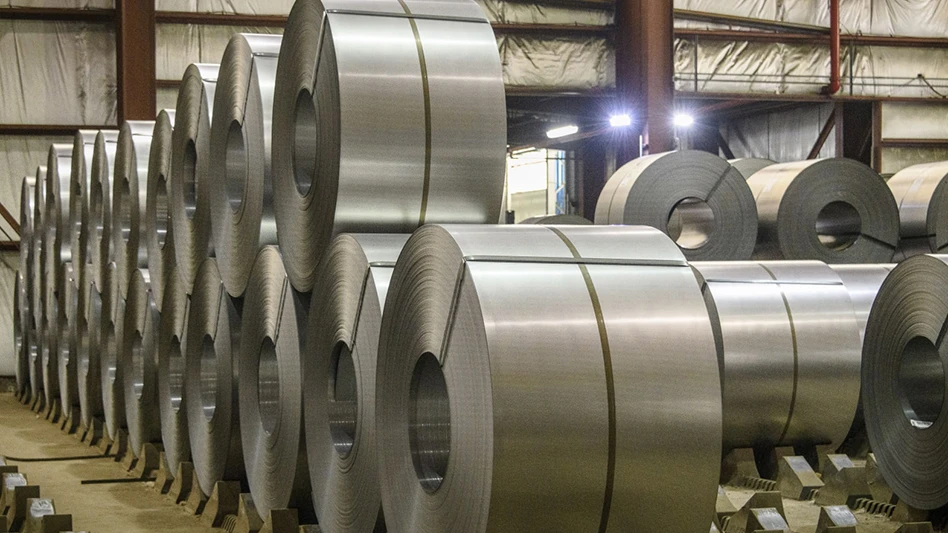Several thousand attendees were on hand to checkout exhibits set up by more than 400 companies at the 2001 WasteExpo, which took place at Chicago’s McCormick Center April 2-4. According to show director Rita Ugianskis-Fishman, preliminary estimates indicate that attendance at the 2001 show was up 4% over the previous year’s event. While exhibitors were pleased with the turnout, many also came away dissatisfied with costs and work practices at McCormick Center, meaning WasteExpo 2001 might have been the last Windy City WasteExpo for the foreseeable future. C&D STANDS FRONT AND CENTER Visitors to the WasteExpo 2001 Exhibit Hall could not mistake that the handling of construction and demolition (C&D) debris was a prominent part of the solid waste show’s overall offerings. Sizable wood grinding and sorting equipment from manufacturers such as Morbark Inc., Winn, Mich., and Continental Biomass Industries Inc. (CBI), Newton, N.H., was on display just inside of the main entrance to the McCormick Place South hall where WasteExpo was held. The C&D recycling component of WasteExpo has grown steadily over the last several years, mirroring the solid waste industry’s attention to the material stream arising from construction and demolition sites. “Over the last five years there’s been a bigger move toward more of the bigger wood grinding and screening equipment being represented,” says Mark Lyman, president of wood processing equipment maker West Salem Machinery Co., Salem, Ore. More of the show’s attendees who run landfills and transfer stations appear to be more interested in wood processing and recycling, according to Lyman. “I think we’re seeing more interest from WasteExpo attendees who run transfer stations and want to incorporate more recycling into their operations. They view wood as a reasonably high percentage of their waste stream that they can isolate and process,” he remarks. While mixed demolition debris represents one source of incoming wood, cleaner wood streams coming from land clearing contractors and lumber yards present an easier opportunity for some business operators to enter the wood recycling segment. “Green waste is kind of its own stream-it comes from its own type of waste generator and it comes in as all green waste,” notes Lyman. “There are also generators of clean wood. Those types of materials can be identified easily as they come through the gate and processed.” To recycled mixed debris takes a greater investment, Lyman notes. “When you get into the mixed waste streams, its gets to be a little more problematic, with sorting lines needed.” WasteExpo will likely continue to feature a variety of C&D processing equipment as long as solid waste handlers remain interested in the recycling possibilities. “Wood can be processed pretty easily and has some end markets-that’s the key,” says Lyman, pointing to colored mulch, boiler fuel, and particleboard end markets as those helping drive the trend. CONTENTIOUS ISSUES Excessive set-up and exhibition fees-some of them under the table-have caused competing companies to come together with one message: Don’t bring WasteExpo back to Chicago’s McCormick Place. Members of the WasteExpo Exhibitor Advisory Committee held a meeting on the last day of WasteExpo 2001 that yielded a consensus recommendation that McCormick Place be removed from the rotation of host facilities. “We just had a discussion, and the majority of the feelings expressed were that Chicago wasn’t a place we wanted to ink in as a permanent stop for WasteExpo,” says Mitch Covington, vice president of national sales for Marathon Equipment Co., Vernon, Ala., and a member of the WasteExpo Advisory Committee. Covington noted that early April Chicago weather “wasn’t optimum for trade show attendance,” and also alluded to “union issues with McCormick Place. It’s an expensive place to hold a show.” Regarding exhibiting costs for equipment makers who wished to bring equipment and machinery into the hall, Covington said, “I can say that it appears much more expensive for the drayage at McCormick than at other convention centers. It’s a very expensive place if you have a lot of equipment.” Covington commended show managers Intertec Exhibitions, Stamford, Conn., for “making a real good effort to make some of these concerns go away,” but added, “it still doesn’t overcome some of the negatives of going to Chicago.” While Covington would not comment regarding under-the-table cash payouts and gratuity requests made by exhibition hall and loading dock workers, several other exhibitors noted that it was a source of irritation. A representative from one recycling equipment manufacturer noted that he kept a roll of $20 bills on hand during set-up and tear-down to deal with the cash payouts. “You have to pay [workers] when they come by asking for money. It’s the only way you’ll get anything done,” said another exhibitor. “The consensus at that meeting was that even though Chicago is a great city, we’re not certain it’s the place for WasteExpo,” remarks show director Ugianskis-Fishman. She remarks that assurances by Chicago convention officials that circumstances had improved since the 1998 WasteExpo at McCormick Center were true, but not all problems were erased. “This show was much improved over 1998; that doesn’t mean Chicago is a perfect convention city yet,” says Ugianskis-Fishman. “There are still hassles and it is still complicated and expensive. The changes helped the smaller companies, but not the larger ones who bring in a lot of equipment and use a lot of space.” WasteExpo 2002 will be held in May at the Las Vegas Convention Center, while Atlanta in late May and early April is the tentatively scheduled for 2003.
Several awards were handed out and three new members were inducted into the Environmental Industries Associations (EIA) Hall of Fame in coordination with the WasteExpo event.
EIA Hall of Fame inductees included Darlene Jeter of Jet-A-Way Inc., Roxbury, Mass.; Keith Foster of Keith Manufacturing, Madras, Ore.; and Floyd Tuominen, a long-time baling equipment executive who recently retired from Excel Manufacturing, St. Charles, Minn.
Jet-A-Way is a recycler of mixed C&D debris with some 50 employees and $10 million in annual revenues. Darlene Jeter co-founded the company with her late husband and has successfully guided the firm since his death.
The Waste Equipment Technology Association (WASTEC), one of the five groups making up the EIA, handed out three Employee of the Year awards:
• Shawnna Romans, Marathon Equipment Co., Vernon, Ala., for sales/marketing
• Randy Lewis, Bes-Pac Solid Waste Equipment, Easley, S.C., for engineering
• Richard Bell, Leach Co., Oshkosh, Wisc., in the production category.
Five EIA Drivers of the Year were also honored, and the National Solid Waste Management Association recognized four individuals for distinguished service and contributions.
Henry C. Jobe of Harris Waste Management Group, Peachtree City, Ga., was honored with WASTEC’s Distinguished Service Award.
Awards & Honors Announced
DEBATING THE FUTURE
The future of WasteExpo was not the only subject of discussion at the event-so was the future of recycling itself.
A packed room of WasteExpo attendees enjoyed “The Great Debate: Is Recycling Garbage?” on Tuesday evening, April 3. The debate featured writer John Tierney, whose New York Time Magazine article “Recycling is Garbage” in 1996 elicited more reader responses than any previous piece in the magazine.
Tierney, who questions the fiscal wisdom of tax-supported recycling programs, debated environmentalist Allen Hershkowitz of the Natural Resource Defense Council, New York.
The crux of Tierney’s argument was that recycling “makes sense for some materials at some times, but not [for] household waste.” Support for curbside programs arose based on two mistaken assumptions, he said: that we are running out of commodities and that landfill space is scarce.
Tierney called copper “more expendable than ever” and said energy, despite recent price rises, is still “cheaper than at any time in history.” The labor-intensive collection and processing of recyclables is the greater waste, according to Tierney, who remarked, “the only resource that gets scarcer and more expensive is human labor...time.”
Hershkowitz countered that while mineral resources have not depleted as quickly as once projected, they are still finite. “A criticism of government is that it fails to pay attention to the long term. Now we are, and we’re being criticized.”
The environmentalist also pointed to the hidden government support the timber and mining industries receive from the federal government as opposed to the shifting and uneven support offered to recycling.
During the rebuttal stages of the debate, Tierney referred again to the labor-intensive nature of recycling. “All of this hand sorting...is where the waste is,” he remarked.
A recycling advocate can only hope that Tierney was able to walk the floor of WasteExpo to see the displays of mechanical screening, sorting and separating companies offering equipment to address the same issue.
Another potential source of conflict for the solid waste and recycling industries lies with the “environmental justice” movement, which was addressed at a WasteExpo session. Environmental justice is a term that has been applied when residents from minority and/or low-income neighborhoods lodge complaints or take legal action against nearby industrial facilities.
The U.S. EPA has developed its own guidelines for how to identify possible environmental justice situations, but calls environmental justice “a goal to be achieved” as opposed to a procedural regimen.
The agency has noted that allegations of environmental justice can include “a dispute over the siting of a pollution-generating facility in a community already inundated with such facilities.” Adhering to that goal would seem to run counter to the notion of zoning, where industrial facilities are purposely located near each other in the interests of community and traffic planning.
The author is editor of C&D Recycler.

Explore the May 2001 Issue
Check out more from this issue and find your next story to read.
Latest from Recycling Today
- Magnomer joins Canada Plastics Pact
- Electra names new CFO
- WM of Pennsylvania awarded RNG vehicle funding
- Nucor receives West Virginia funding assist
- Ferrous market ends 2024 in familiar rut
- Aqua Metals secures $1.5M loan, reports operational strides
- AF&PA urges veto of NY bill
- Aluminum Association includes recycling among 2025 policy priorities





